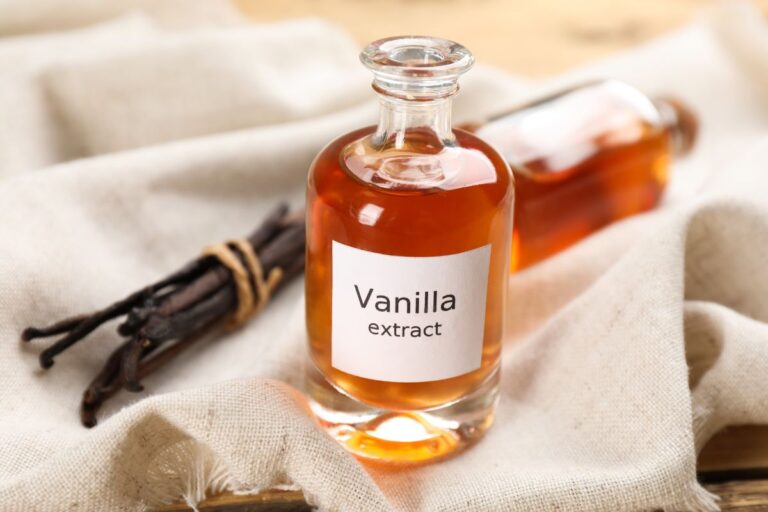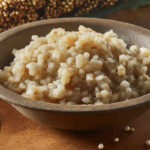Does vanilla extract need to be refrigerated? Vanilla extract is one of the most popular and versatile flavoring agents in baking and cooking. And there’s nothing like it. It adds an unmistakable rich and aromatic taste to cakes, cookies, ice cream, and many other dishes.
But how should you store your vanilla extract to preserve its quality and freshness?
In this blog post, we will answer these common questions and more. We will explore the ingredients and production process of vanilla extract, debunk some myths about refrigeration, and share the best way to store your vanilla extract for optimal shelf life.
What is Vanilla Extract Made Of?
Vanilla extract is a liquid solution that contains the flavor and aroma of vanilla beans. Vanilla beans are the seed pods of a tropical orchid plant called Vanilla planifolia.
The pods are harvested when they are green and then cured through a process of drying, sweating, and conditioning. This process develops the characteristic brown color and complex flavor of vanilla beans.
To make vanilla extract, the cured vanilla beans are chopped and soaked in a mixture of alcohol and water. The alcohol acts as a solvent that extracts the flavor compounds from the beans. The water dilutes the alcohol to a safe and legal level.
The resulting liquid is filtered and bottled as vanilla extract. The FDA requires that pure vanilla extract contains at least 35% alcohol and 13.35 ounces of vanilla beans per gallon of liquid.
To Refrigerate or Not to Refrigerate: Debunking Myths
One of the most common questions that people have about vanilla extract is whether they need to refrigerate it or not.
The answer is no, you do not need to refrigerate vanilla extract. In fact, refrigerating vanilla extract can have some negative consequences for its quality and flavor.
Some people may think that refrigerating vanilla extract can prevent it from spoiling or losing its potency.
However, this isn’t true. Here’s why:
- Vanilla extract is a stable product that can last for years without refrigeration.
- The high alcohol content and the natural antimicrobial properties of vanilla beans prevent the growth of bacteria, mold, or yeast in the extract.
- Natural flavor compounds in vanilla extract are don’t degrade easily.
On the other hand, refrigerating vanilla extract can cause some problems for its appearance and consistency.
When vanilla extract is exposed to cold temperatures, it can form crystals or become cloudy. This is because some of the flavor compounds in vanilla extract are less soluble in cold alcohol than in warm alcohol.
The cloudiness doesn’t affect the safety or flavor of vanilla extract, even if it looks less appealing.
Refrigerating vanilla extract can also make it thicker and more viscous, which can affect the accuracy of your measurements in recipes.
The Best Way to Store Vanilla Extract
Now that you know that you do not need to refrigerate vanilla extract, you may wonder what is the best way to store it. Here are some tips on maintaining optimal storage conditions for your vanilla extract:
- Tip #1: Avoid freezing or refrigerating. As we discussed above, freezing or refrigerating vanilla extract can cause it to form crystals, become cloudy, or thicken. These changes can affect the appearance and consistency of your vanilla extract, and make it harder to use in your recipes. Therefore, it is best to avoid freezing or refrigerating vanilla extract, and store it at room temperature instead .
- Tip #2: Ensure proper storage practices. Vanilla extract is sensitive to light, heat, and air, which can affect its quality and flavor over time. To prevent this, you should store your vanilla extract in a dark, cool, and dry place, away from direct sunlight, heat sources, or humidity. You should also use a glass or ceramic container with a tight-fitting lid, and avoid plastic or metal containers that can leach chemicals or react with the extract .
- Tip #3: Secure the lid. Another important tip for storing vanilla extract is to secure the lid after each use. This will prevent the evaporation of alcohol and water, which can reduce the volume and potency of your vanilla extract. It will also prevent the exposure of oxygen, which can oxidize and degrade some of the flavor compounds in your vanilla extract. Securing the lid will also keep out dust, dirt, or insects that can contaminate your vanilla extract.
Does Vanilla Extract Go Bad?
Another common question that people have about vanilla extract is whether it goes bad or expires.
The answer is no, vanilla extract does not go bad or expire.
As we mentioned earlier, vanilla extract is a very stable product that can last for years.
However, this does not mean that vanilla extract stays the same forever. Vanilla extract can change slightly in color, aroma, or flavor over time, depending on the storage conditions and the quality of the ingredients.
For example, vanilla extract can darken or lighten in color, depending on the type and amount of vanilla beans used. Vanilla extract can also develop a stronger or weaker aroma or flavor, depending on the exposure to light, heat, or air.
These changes do not mean that vanilla extract is spoiled or unsafe to use. They are natural and normal variations that occur in any natural product.
However, they can affect the quality and intensity of your vanilla extract, and make it less suitable for some recipes. Therefore, it is recommended to use your vanilla extract within three to five years of opening, or before the best-by date on the label, for optimal results.
FAQs
Here are some of the frequently asked questions about vanilla extract storage:
Q: Can I use vanilla extract after the best-by date?
A: Yes, you can use vanilla extract after the best-by date, as long as it has been stored properly and does not show any signs of spoilage.
The best-by date is not an expiration date, but a quality indicator that tells you when the vanilla extract will start to lose its peak flavor and aroma.
Vanilla extract does not go bad or expire, but it can change slightly in color, aroma, or flavor over time.
Therefore, it is best to use your vanilla extract within three to five years of opening, or before the best-by date on the label, for optimal results.
Q: How can I tell if vanilla extract is spoiled or contaminated?
A: Vanilla extract is very unlikely to spoil or become contaminated, as long as it has been stored properly and securely.
However, if you notice any of the following signs, you should discard your vanilla extract and replace it with a new one:
- The vanilla extract has an unpleasant or off odor, such as sour, musty, or rancid.
- The vanilla extract has visible mold, yeast, or bacterial growth on the surface or inside the container.
- The vanilla extract has foreign particles, debris, or insects in the liquid or on the lid.
- The vanilla extract has changed significantly in color, aroma, or flavor, and does not taste or smell like vanilla anymore.
Q: How can I restore vanilla extract that has formed crystals or become cloudy?
A: Vanilla extract that has formed crystals or become cloudy is not spoiled or unsafe to use, but it can look less appealing and affect the accuracy of your measurements and recipes.
To restore vanilla extract that has formed crystals or become cloudy, you can try the following steps :
- Bring the vanilla extract to room temperature if it’s been refrigerated or frozen.
- Shake the vanilla extract well, to dissolve the crystals or disperse the cloudiness.
- Place the vanilla extract in a warm water bath, and heat it gently until the crystals or cloudiness disappear. Do not boil or overheat the vanilla extract, as this can damage the flavor compounds.
- Filter the vanilla extract through a fine mesh strainer or a coffee filter, to remove any remaining crystals or impurities.
Bonus Tip for Vanilla Extract Shelf Life: Choose Quality
One of the best ways to ensure that your vanilla extract lasts long and retains its flavor and aroma is to choose a high-quality vanilla extract. High-quality vanilla extract is made from premium vanilla beans that have been cured and processed properly to retain a high concentration of flavor compounds. It also contains pure alcohol and water, and does not have any artificial flavors, colors, or preservatives added.
Premium vanilla extract may cost more than low-quality vanilla extract, but it is worth the investment. High-quality vanilla extract will provide a richer and more complex flavor to your dishes, and will require less amount to achieve the same effect. It will also last longer and change less over time, as it has more stability and resistance to degradation.
To choose a high-quality vanilla extract, you should look for the following features on the label or the website of the product :
- Look for “pure vanilla extract” or “100% vanilla extract” on the label and that it meets the FDA standards for vanilla extract.
- The ingredients should just be “vanilla beans, alcohol, and water”. No other additives or fillers.
- The product specifies the type and origin of the vanilla beans used, such as Madagascar Bourbon, Tahitian, or Mexican.
- The product indicates the amount of vanilla beans used per gallon of liquid.
- The product has a clear and natural color, aroma, and flavor. There shouldn’t be any signs of crystals, cloudiness, or sediment.
Conclusion
Vanilla extract is a wonderful ingredient that can enhance the flavor and aroma of your dishes. However, to enjoy its full benefits, you need to store it properly and avoid some common mistakes. You do not need to refrigerate vanilla extract, and refrigerating vanilla extract can actually harm its quality and consistency.
Further Reading
Should Mustard Be Refrigerated?
Should Soy Sauce Be Refrigerated?
Should Honey Be Refrigerated?
Does Fish Sauce Need to Be Refrigerated?
Should Worcestershire Sauce Be Refrigerated?
Does Molasses Need to Be Refrigerated?
Does Apple Cider Vinegar Need to Be Refrigerated
Better Living uses affiliate links. If you make a purchase through them, we may receive a small commission (for which we are deeply grateful) at no cost to you.



